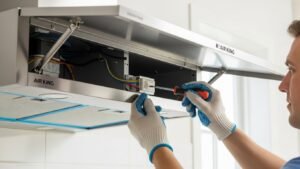Appliance repairs can be a significant expense for homeowners and renters alike. Understanding how to budget for Appliance Repairs is crucial.
Unexpected breakdowns can strain your finances if you’re not prepared. Knowing the average repair prices helps you plan better.
From refrigerators to washing machines, each appliance has its own repair cost range. These costs can vary based on several factors.
Regular maintenance can prevent some issues, but not all. It’s wise to set aside funds for potential repairs.
This guide will help you navigate appliance repair costs and budget effectively. Stay prepared and avoid financial surprises.
Why Budgeting for Appliance Repairs Matters
Budgeting for appliance repairs is essential for managing household expenses effectively. Unexpected repair bills can disrupt your budget. Being prepared can alleviate financial stress.
When appliances break down, you’re often left with no choice but to fix them immediately. Planning ahead ensures you won’t have to sacrifice other necessities.
Key reasons to budget include:
- Avoiding financial strain from unplanned expenses.
- Maintaining household efficiency by ensuring quick repairs.
- Having peace of mind knowing you’re financially prepared.
By being proactive, you gain control over your finances. Budgeting also helps avoid panic when appliances fail. This foresight is crucial for maintaining financial health.

Understanding Appliance Repair Costs
Appliance repair costs can differ greatly depending on several factors. The type of appliance and the nature of the issue play major roles. Complex problems often demand more skilled labor and time.
A typical service call ranges from $50 to $100. However, this fee might not include labor or parts. Understanding these charges can prevent surprises when the bill arrives.
Hourly repair rates can vary. For example, refrigerator repair cost per hour might run from $100 to $200. Also, dishwasher repair prices generally fall between $150 and $300.
Factors that influence repair costs include:
- The appliance’s age and brand
- Availability and cost of parts
- The technician’s level of expertise
Knowing these details helps you estimate potential expenses. With this knowledge, you can decide whether to repair or replace an appliance. Planning for these costs in advance keeps your budget on track and your household running smoothly.
How to Unclog Garbage Disposal: Step-by-Step Guide & Tips
Average Repair Prices for Common Appliances
Repair costs for appliances vary based on the appliance type and the issue. It’s crucial to understand these costs to budget effectively. Below, we explore average repair prices for common household appliances.
Refrigerators are essential in any home. Typically, their repair costs range from $100 to $400. This depends largely on the issue and parts needed. More complex problems can be pricier.
Washing machines also frequently need repairs. Costs here fall between $150 and $400, depending on the problem. Washer transmission repair costs specifically can be high. This complexity often leads to higher labor charges.
Dishwashers face issues that, on average, can set you back $150 to $300. Again, the root of the problem dictates exact pricing. Simple motor or drainage issues usually cost less.
Dryers, while generally reliable, may need repairs costing between $100 and $400. This range covers both basic and complex repairs. Broken thermostats or faulty heating elements are common problems.
For specific brands like Samsung or Maytag, repairs may incur slightly higher costs. This is due to branded part replacement and specialized expertise. Also, premium brands often have more sophisticated components.
In summary, common appliance repair prices may vary widely. You can expect:
- Refrigerators: $100 – $400
- Washing Machines: $150 – $400
- Dishwashers: $150 – $300
- Dryers: $100 – $400
This knowledge helps in planning for potential repair costs in advance. Understanding these expenses allows you to prepare better, reducing stress when an appliance breaks down.
Factors That Influence Appliance Repair Pricing
Several factors play a role in appliance repair pricing. Understanding these can help manage your repair budget effectively. It’s not just about the type of appliance; many other elements influence costs.
Firstly, the age of your appliance matters. Older models often need more expensive repairs. Replacement parts might be scarce or costly, impacting the overall price.
The technician’s expertise also affects pricing. Experienced professionals often charge more. However, their skill can ensure a more accurate and efficient repair.
Key factors affecting repair costs include:
- Age and condition of the appliance
- Availability and cost of parts
- Technician expertise and experience
By considering these factors, you can plan for repair expenses with greater accuracy. This preparation can help manage financial surprises and maintain appliance functionality efficiently.

How to Plan and Set Aside Money for Repairs
Planning for appliance repairs can prevent unexpected financial strain. Begin by evaluating your home’s essential appliances. Prioritize those most likely to need repair soon.
Establish a repair fund by setting aside money monthly. Even a small amount can accumulate over time. This fund will serve as a safety net for unexpected repair costs.
Consider these steps to effectively budget for repairs:
- Assess which appliances are crucial
- Set a monthly savings goal
- Keep funds separate for repairs
By following these steps, you can prepare for inevitable appliance repairs. Planning and saving in advance will ease financial burdens and ensure your home runs smoothly.
Tips to Reduce Appliance Repair Costs
Lowering appliance repair expenses is possible with a few smart actions. Start by performing regular maintenance tasks. This can prevent major issues and prolong your appliance’s life.
Consider handling minor repairs yourself if you’re handy. Be cautious, as DIY mistakes can lead to more costly repairs. Use online resources or consult manuals before attempting repairs.
Explore these practical tips to cut repair costs:
- Perform regular cleaning and maintenance
- Handle minor repairs when feasible
- Compare service quotes from multiple technicians
By following these strategies, you can effectively manage and reduce your appliance repair expenses. Being proactive and informed makes all the difference.
Garbage Disposal Not Working? How to Fix a Jammed or Humming Disposal in Simple Steps
When to Repair vs. Replace an Appliance
Deciding whether to repair or replace an appliance can be tricky. Consider the age and condition of the appliance. If the repair costs exceed half the price of a new one, replacement might be wiser.
Evaluate how often the appliance needs repairs. Frequent issues can signal it’s nearing the end of its useful life.
Think about these factors when making your decision:
- Repair cost versus replacement cost
- Age and condition of the appliance
- Frequency of repairs needed
These considerations will help you make the most cost-effective choice.

Final Thoughts: Staying Prepared for Appliance Repairs
Being proactive can help manage repair costs effectively. Regularly set aside funds for potential repairs to avoid financial strain.
Understanding typical repair costs and factors influencing them can enhance your budgeting strategy. This knowledge also aids in making informed decisions about repairs versus replacements.
Staying informed and prepared ensures you handle appliance issues without stress. A little planning today can prevent major headaches tomorrow. Remember, well-maintained appliances not only last longer but also save money in the long run.





